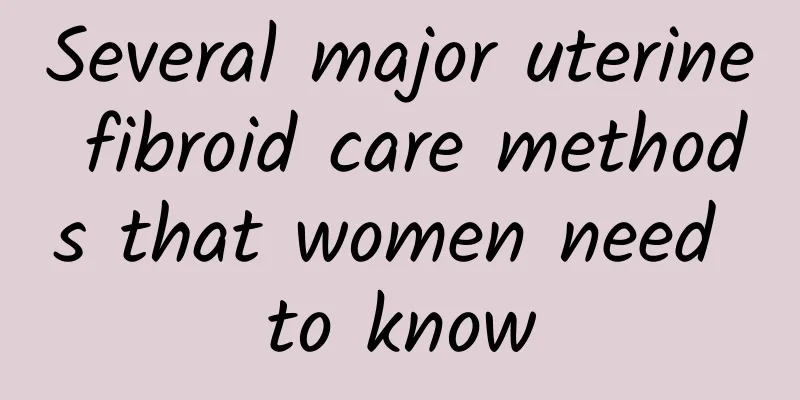What are the symptoms of adenomyosis and adenomyoma?

|
The main symptoms of adenomyosis and adenomyoma include abdominal pain during menstruation, abnormal menstrual blood flow, infertility, and irregular menstruation. Patients should seek medical diagnosis as soon as possible according to the severity of the symptoms, and combine medication or surgery when necessary. 1. Abnormal menstruation Patients with adenomyosis and adenomyoma often experience irregular menstrual cycles or excessive menstrual bleeding. Adenomyosis causes endometrial tissue to invade the myometrium, enlarging the uterus, causing increased menstrual bleeding or prolonged menstruation. Some patients may experience spotting or blood clots before menstruation. If excessive menstrual bleeding causes symptoms such as fatigue and dizziness, iron supplements should be taken in a timely manner, and a doctor should be consulted as soon as possible to resolve potential problems. 2. Dysmenorrhea The most typical symptom of adenomyosis is gradually worsening abdominal pain during menstruation. This pain is mostly progressive dysmenorrhea, which worsens over time and can spread to the lower back or thigh. Some patients find it difficult to live or work normally due to pain. Painkillers (such as ibuprofen) can relieve pain in the short term, but persistent dysmenorrhea requires medical evaluation. For those with severe dysmenorrhea that is not effective with medication, hormonal drugs (such as GnRH agonists) or surgical treatment (such as uterine artery embolization) can be considered. 3. Uterine enlargement and tenderness Adenomyoma may cause the uterus to increase abnormally in size. Some patients may feel a lump in the lower abdomen or feel pain when pressing the uterine area. This symptom often indicates that the lesion is more serious and may cause dysuria, pain during defecation, or pelvic pressure. To relieve these symptoms, hysteroscopy can be used to identify the lesion and conservative treatment (such as oral contraceptives) or surgical intervention (such as lesion resection) can be taken under the guidance of a doctor. 4. Infertility and miscarriage Adenomyosis and adenomyoma may cause damage to the endometrial structure, which in turn affects embryo implantation, leading to infertility or miscarriage. For patients with infertility caused by adenomyosis, ovulation-inducing drugs or assisted reproductive technology (such as in vitro fertilization) can be tried, but patients with severe adenomyoma or uterine deformation may still need surgical treatment first. Adenomyosis and adenomyoma have a significant impact on the quality of life. Once symptoms appear, such as severe dysmenorrhea or abnormal menstrual blood flow, you should seek medical attention as soon as possible to get a clear diagnosis and take necessary treatment measures. Through medication, surgery or lifestyle adjustments, most patients can achieve good recovery results. |
<<: Abnormal yellow vaginal discharge in newborns
>>: Drugs for the treatment of adenomyosis
Recommend
Can I get pregnant if I have cervical erosion 3rd degree?
In recent years, the incidence of many gynecologi...
What are the specific causes of cervical hypertrophy?
Nowadays, many married women suffer from cervical...
6 weight loss plans after the Chinese New Year: Lose half a kilogram of weight every week
How to lose weight after the New Year? Nutritioni...
How to diagnose acute adnexitis?
As we all know, acute adnexitis refers to the sym...
What to eat to speed up menstruation if your period is delayed for 7 days
What can I eat to make my period come faster if i...
How to take care of women after abortion? How to take care of women after abortion? It is safe and effective
Abortion surgery will more or less cause varying ...
What foods can be eaten to treat pelvic peritonitis
I believe that many people are already familiar w...
Treatment remedies for Bartholinitis
The Bartholin's glands are located at the bac...
People who are suitable for medical abortion
Women with unexpected pregnancy can use artificia...
Diagnosis of vulvar leukoplakia is based on symptoms and biopsy
The diagnosis of vulvar leukoplakia mainly includ...
The harm of long-term untreated irregular menstruation
What are the hazards of irregular menstruation? A...
Symptoms of adnexitis
Among the female reproductive organs, the ovaries...
What should I do if I have uterine fibroids? Treatment of uterine fibroids
Uterine fibroids are the most common benign tumor...
How to take good care of adnexitis in life
Adnexitis is a common disease in life. Some women...
What is the diagnosis of congenital absence of vagina?
What are the symptoms of congenital absence of va...









